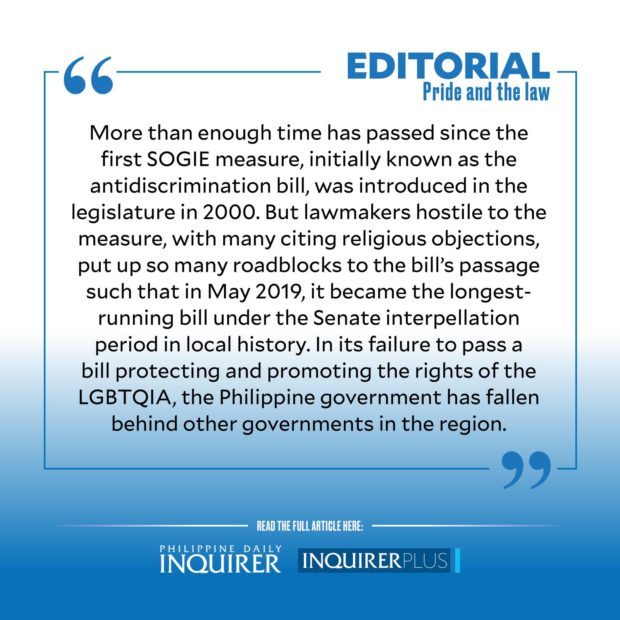Pride and the law
June is observed as Pride Month in the Philippines and elsewhere in the world. It’s a month meant to celebrate, promote, and protect the rights of members of the LGBTQIA+ or the “lesbian, gay, bisexual, transgendered, queer, intersex, asexual plus” community.
But more importantly, it’s a month meant to call public attention to and support for laws recognizing the rights of sexual minorities in countries, such as the Philippines, where no such laws exist. And where laws exist, there is still a need to ensure that these are implemented fully and fairly, mainly by encouraging public attitudes to become more accepting, tolerant, and respectful of LGBTQIA rights.
Article continues after this advertisementThis year, the observance of Pride Month gains added fillip, at least in the Filipino consciousness, by the recent “coming out” of Miel Pangilinan, the teenage youngest daughter of outgoing senator Kiko Pangilinan and “megastar” Sharon Cuneta. Over social media, Miel announced that she is coming out as “openly and publicly queer.” She declared: “It’s a really emotional and freeing time right now, and I’m endlessly thankful to my close friends and family who have supported me and shown me love as I’ve grown and explored my own gender and sexual identity.”
For their part, Miel’s parents have come out unequivocally in support of their daughter’s decision. “I love all my children and will support them in their lives and choices,” Cuneta posted. “I am proud of my children, and all my children are perfect.” Pangilinan assured Miel that he “will always be here for you. Always. For certain. Forever. No matter what. Period. No more comma. The end of the paragraph. Amen.”
While the megastar’s daughter is fortunate in the utter support shown by her family and friends, for thousands of LGBTQIA individuals, especially young people, support hasn’t been as firm and unwavering. For many, discrimination begins at home, where other family members bully them for their “unseemly” behavior, with physical punishment and constant harangues. In school, lesbian and gay students face discrimination from teachers and administrators, with petty rules on attire and behavior enforced harshly. In the workplace, sexual minorities face difficulties getting hired or promoted, being sexually harassed, or being discriminated against in terms of wages and treatment.
Article continues after this advertisementThis may be why Sen. Risa Hontiveros, who authored the Senate version of the Sexual Orientation, Gender Identity and Expression (SOGIE) bill in the 18th Congress, said that she will observe Pride Month by leading the drive to have the SOGIE bill passed in the incoming 19th Congress.
Hontiveros stressed that the bill is in line with the spirit of the Constitution and ensures safe schools, accessible health care, and sufficient livelihood for more Filipinos. “It is time we begin the process of healing the wound created by the gap in our laws that has allowed for bullying, ostracism, and violence to way too many Filipinos. It is time we forge a country that includes all, loves all,” she added.
Indeed, more than enough time has passed since the first SOGIE measure, initially known as the antidiscrimination bill, was introduced in the legislature in 2000. But lawmakers hostile to the measure, with many citing religious objections, put up so many roadblocks to the bill’s passage such that in May 2019, it became the longest-running bill under the Senate interpellation period in local history.
In its failure to pass a bill protecting and promoting the rights of the LGBTQIA, the Philippine government has fallen behind other governments in the region.
Recently, Thailand’s Cabinet ratified a bill that could make it the first Southeast Asian country to legalize same-sex unions. The bill will be forwarded to parliament before it becomes a law. It doesn’t go as far as endorsing same-sex marriage, reports say, but it will enable couples to adopt children, jointly manage assets and liabilities, and exercise inheritance and heritage rights between partners, which are not covered by current laws.
If passed, the bill would make Thailand the second country in Asia to allow same-gender unions, with Taiwan having legalized same-sex marriage in 2019.
In the United States, President Joe Biden signed an executive order last Wednesday aimed at giving further protection to the LGBTQIA community. Reports said the order was “designed to counter efforts by Republican politicians like Gov. Ron DeSantis of Florida, who has pushed through a measure banning teachers from providing instruction regarding gender identity or sexual orientation.” The order also bans the use of so-called “conversion therapy” alleged to “convert” gay and lesbian youth to adopt a heterosexual identity.

















